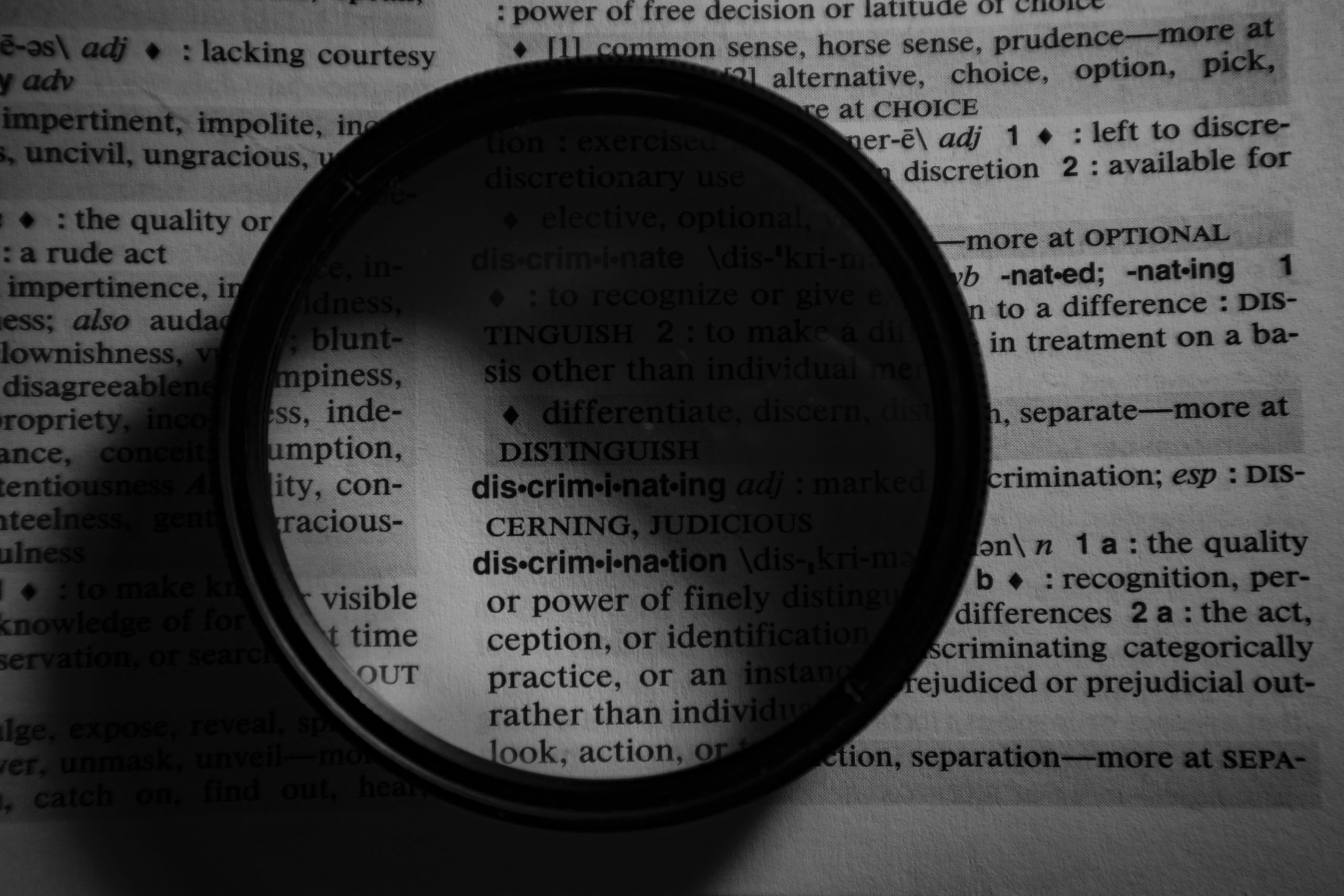Discrimination is when someone is treated differently due to protected characteristics such as age, race, religion, gender, or disabilities. When it comes to employment, discrimination can happen during the hiring process, in the workplace, or in regard to terminations. Although workplace discrimination is unlawful, it happens far too often. This can lead to emotional distress, decreased morale and job performance, and even physical health problems. Workplace discrimination can have detrimental effects on all aspects of a person’s life.
What Qualifies as Discrimination?
There are things we consider to be discrimination and there are things defined as discrimination by law. There are many situations in which a persona may feel as though they are being discriminated against. But when seeking legal action, it is important to know what is considered discrimination under the law. Employment discrimination is defined by the EEOC as:
- Being treated unfairly due to your age, race, religion, gender, sexual orientation, or disability
- Being harassed due to your age, race, religion, gender, sexual orientation, or disability
- Being denied accommodations for your religion or disability
- Being asked invasive questions about your medical or genetic information
- Being retaliated against for making a complaint
Differences Between Discrimination, Bullying, & Harassment
It is important to understand the different classifications of behaviors when discussing things like discrimination and harassment in order to address these issues.
Discrimination – When an employee is treated unfairly due to their age, race, religion, gender, sexual orientation, or disability. This can affect one employee or many at a time.
Harassment – When an employee is subjected to behavior that is offensive, humiliating, or threatening due to their age, race, religion, gender, sexual orientation, or disability.
Bullying – When an employee is subjected to repetitive negative actions and behavior that is detrimental to their mental and physical health.
What is Discrimination in the Workplace?
Discrimination occurs when someone is treated differently than another group of people and it can even occur at work. When a person is discriminated against by a coworker or employer, it is considered workplace discrimination. According to the Civil Rights Act of 1964, employers are prohibited from taking adverse employment action against an employee due to race, color, national origin, religion, or sex. Individual states also have their own laws and regulations surrounding workplace harassment.
What are Protected Classes?
In the state of California, employees are protected from being discriminated against or harassed for the following characteristics:
- Age
- Ancestry
- Color
- Disability
- Gender Identification
- Genetic Information
- Marital Status
- Medical Conditions
- Military Status
- National Origin
- Race
- Religion
- Pregnancy
- Sex
- Sexual Orientation
They are also protected against discrimination for engaging in the following protected activities:
- Requesting personal health care leave
- Requesting pregnancy leave
- Requesting family care leave
- Reporting illegal behavior in the workplace
- Participating in an investigation
Types of Workplace Discrimination
There are two different types of discrimination in the workplace.
- Direct liability occurs when the employer is an active participant in the discrimination, often seen in discriminatory company policies.
- Vicarious liability occurs when the employer is not an active participant in the discrimination, but took no action to prevent or stop it, such as when an employee is discriminating against their coworker.
Common Examples of Discrimination at Work
In 2019, the Equal Employment Opportunity Commission received over 140k claims of discrimination. They reported that the discrimination related claims most commonly involved:
| Discrimination | # of Charges | Percentage |
| Retaliation | 39,110 | 27.8% |
| Disability | 24,238 | 17.2% |
| Race | 23,976 | 17.0% |
| Sex | 23,532 | 16.7% |
| Age | 15,573 | 11.1% |
| National Origin | 7,009 | 4.9% |
| Color | 3,415 | 2.4% |
| Religion | 2,725 | 1.9% |
| Equal Pay | 1,117 | .01% |
| Genetic Information | 209 | 0.0% |
Disability Discrimination
The Americans with Disabilities Act prohibits employers from discriminating against their employees on the basis of disability. The law defines disability as:
- Physical or mental conditions that substantially limit someone’s major life activities
- Having a history of disabilities
- Physical or mental conditions that are minor and impermanent
The law also protects people from discrimination in the event that an employer believes them to have a disability even if they do not. Employers are not permitted to ask employees or prospective employees questions about their disability status, and are required to provide accommodations when requested.
Racial Discrimination
Employees are legally protected from discrimination or harassment based on race, color, or national origin. Examples of racially motivated harassment often consist of:
- Racial slurs
- Offensive jokes
- Derogatory comments
- Displaying hate group symbols
A single isolated incident may not constitute harassment in the eyes of the law. Harassment is generally defined as repetitive persistent behavior severe enough to create a hostile or toxic working environment.
Employers are also prohibited from basing adverse employment action decisions such as demotions or terminations on the race, color, or national origin of their employees. Some company policies may also be considered unlawfully discriminatory if the target or adversely affect certain groups. A common example of this is strict guidelines regarding hairstyles in the workplace.
Sex / Gender Discrimination
Employees are legally protected against discrimination based on sex. This includes biological sex, gender identity, and sexual orientation. Sexual harassment is also prohibited under sex discrimination. Some common examples of sex discrimination and harassment may include:
- Someone making unwanted sexual advances
- Favors or blackmail requiring sexual payment
- Offensive jokes about orientation or identity
- Intentionally misgendering or deadnaming someone
- Asking invasive questions about someone’s anatomy
- Disparaging remarks about someone’s abilities based on their sex
- Paying one sex or gender more than another for the same job
- Demoting or terminating someone for getting pregnant
- Refusing to hire or promote someone because they might become pregnant
Age Discrimination
The Age Discrimination in Employment Act was created as federal law to protect workers who are 40 and above from discrimination based on their age. This law does not offer the same protections for people under 40, though some state laws may have their own specific regulations to protect younger workers.
National Origin Discrimination
National origin discrimination occurs when employees or applicants are treated differently due to their perceived or actual place of birth, ancestry, native language or accent, customary practices, cultural identity, or look. This type of discrimination is usually the result of cultural suppression that occurs at work and is expressly prohibited by Title VII and California state laws.
Religious Discrimination
It is illegal to discriminate against or harass an employee for their religion. It is also illegal to discriminate against or harass an employee for the religions of those they associate with. Not only are employees protected from harassment and adverse employment action, they are also protected from job segregation or being kept from working certain positions because of their religion. Employers are also expected to make reasonable accommodations for employees when needed such as:
- Time off for holiday observance
- Including options for dietary restrictions in company provided food
- Reassignments
- Altering minor policies such as dress codes
Actions That Are the Result of Discrimination in the Workplace
There are many ways in which discrimination and retaliation may manifest. Some examples of discrimination in the workplace include:
- Not being hired
- Being paid less than others who work the same job
- Being denied benefits
- Being given the worst tasks and shifts
- Being denied training opportunities
- Being passed over for promotion
- Being subjected to offensive jokes and derogatory comments
- Being held to a higher performance standard
- Being micromanaged
- Unwarranted reprimands
- Being denied leave or accommodations
- Termination
While some of these actions may have other motivations behind them, they may be due to discrimination. One of the main things to look at is how other employees are treated as well.
Laws That Prohibit Workplace Discrimination
In 1964, the Civil Rights Act was established as federal law, prohibiting employers from discriminating against their workers for their race, religion, color, sex, or national origin. The Equal Employment Opportunity Commission was created to enforce this law. Government contractors are prohibited from discrimination by Executive Order 11246. The Americans with Disabilities Act was established in 1990 and includes antidiscrimination regulations for the workplace. On a state level, the Fair Employment and Housing Act protects California employees from workplace discrimination.
Who is Responsible for Protecting Against Workplace Discrimination?
The Equal Employment Opportunity Commission, otherwise known as the EEOC, is responsible for enforcing federal antidiscrimination employment laws and handling discrimination claims. The EEOC protects people from discrimination, harassment, and retaliation based on their age, race, color, national origin, religion, gender, gender identity, sex, pregnancy, sexual orientation, disabilities, or genetic information.
In California, the Civil Rights Department, otherwise known as the CRD, is responsible for enforcing state antidiscrimination employment laws such as the Fair Employment and Housing Act as well as the California Family Rights Act. They also enforce state laws and regulations governing sexual harassment prevention training.
Steps To Take When an Employee is a Victim of Workplace Discrimination
Document Everything
Documentation is one of the most important forms of evidence to have. When workplace discrimination occurs, it is best to keep copies of all emails, text messages, and other correspondence or documents such as doctors’ notes and writeups. Any complaints about the discrimination to your supervisor or human resources department should be made in writing and sent via email. The complaint should be clear and detailed, documenting exactly what happened and when.
File a Workplace Discrimination Complaint
The first step in filing an official claim for workplace discrimination is to file a complaint with the Equal Employment Opportunity Commission. They will then review the matter and may investigate on their own. Once the EEOC provides you with a Right to Sue letter, you may then go about filing a lawsuit. When navigating the legal process, it is important to be aware of the statute of limitations that may be in place and to file everything in a timely manner.
How to Prove Workplace Discrimination
It can be difficult sometimes to know if you have grounds for a discrimination case. One method people use to make that determination is the McDonnell-Douglas test. There are four basic questions to ask yourself, and if the answer to all of them is yes, then you may have a solid claim:
- Do you fall under a protected class?
- Are you properly qualified for the job you were performing?
- Did your employer take adverse employment action?
- Were you replaced by someone who is not part of the same protected class as you?
There are many other questions to consider when assessing a discrimination claim. The details of the situation may be important. The more evidence you can gather, the easier it will be to prove your claim. Some additional questions to consider are:
- Does the employer have a pattern or history of bias?
- Were you treated egregiously unfairly?
- Have other employees in the same class as you experienced the same treatment?
- Are there disproportionately fewer members of your class employed at your job?
- Have your employers made derogatory comments about your particular class?
- Has your employer gone against company policy in order to treat you unfairly?
- Are those not in the same class treated better?
Contact Mesriani Law Group if You Have Experienced Workplace Discrimination
There are many ways in which someone may experience discrimination in the workplace. When this happens, it can be devastating. No one should have to face discrimination or harassment, and no one should have to fight against it alone. An employment attorney can help you navigate through the ordeal and get you the compensation you deserve. Our attorneys are experienced, hardworking, and dedicated to our clients. If you have been the victim of workplace discrimination or harassment, call Mesriani Law Group today for a free consultation.
Workplace Discrimination FAQs
What are 3 examples of discrimination?
Discrimination can come in many forms. There are several protected classes and various ways that an employer may discriminate against them. Three examples of discrimination in the workplace are:
• A CEO paying his male assistants much more than his female assistants.
• A manager making offensive jokes and comments about an employee’s race.
• An employee being terminated for requesting accommodations for a disability.
What is the most common workplace discrimination?
The Equal Employment Opportunity Commission has reported that the most common complaints they receive are regarding retaliation. Retaliation is a form of discrimination that can happen to any protected class. Retaliation is when an employer takes adverse employment action against an employee in response to the employee engaging in a protected activity. Examples of this can include:
• Being written up for going on disability leave
• Being demoted for participating in an investigation
• Being terminated for filing a complaint
What qualifies as discrimination at work?
Workplace discrimination is when someone is treated unfairly because they are a member of a protected class, or they have engaged in a protected activity. Being treated poorly by an employer or coworkers does not in itself qualify as discrimination. Workplace discrimination:
• Black employees being written up for doing things white employees are permitted to do
• A diabetic employee not being allowed to take food and insulin breaks
• An employee being terminated for becoming pregnant NOT workplace discrimination:
• An employer being rude and yelling at all of the employees
• An employee being terminated for always coming in late and doing their job poorly
• Coworkers being mean to an employee because they don’t like their personality
What is a real-life example of discrimination?
Jane Doe turns 50 years old. At her office birthday party, her manager asks her if she’s planning to retire soon. Over the next week, the manager begins second guessing all of Jane’s work. He repeatedly asks her if she understands the basic concepts of her job and suggests that getting older may be leading her to make more mistakes. Jane is then told that the amount of work she is expected to do each day has been doubled and if she can’t keep up, she may not be fit for her job anymore. Jane is berated for everything she does and the manager makes jokes about dementia and needing glasses. Jane is written up for not meeting the new excessive standards and is told she can take early retirement or be terminated. The company hires a 20 year old to fill the position. Jane has been the victim of age discrimination.








